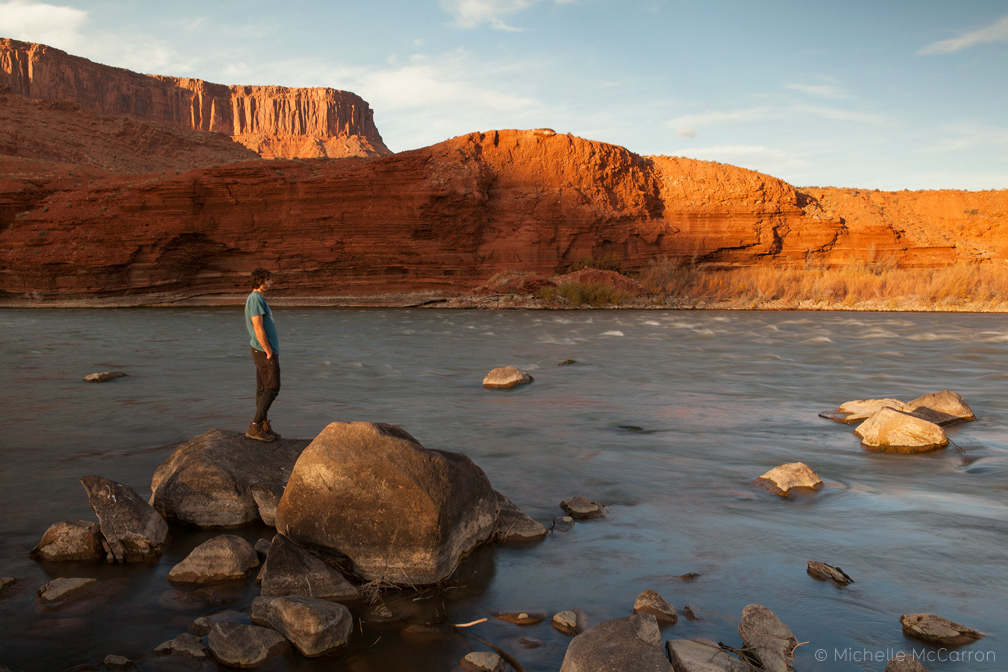Featured image by Michelle McCarron
Editor’s note: This is the latest installment from Will Falk as he follows the Colorado River from headwaters to delta, before heading to court to argue for the Colorado River to be recognized as having inherent rights. More details on the lawsuit are here. The index of dispatches is here.
by Will Falk / Deep Green Resistance Southwest Coalition
Hear the white crash of her torrents on the boulders she drags through the desert, feel the unyielding red rock she pushes through, lose your balance in the impatience of her swift streams, and you’ll know: The Colorado River needs to provide her waters and yearns for her home in the sea.
I spent several hours in silence with the Colorado River last night listening to her speak of her desires while I pondered our lawsuit that seeks rights for the river. I saw the silver sparks of minnows playing under brown stones. I watched the wind shower gray pools with gold cottonwood leaves. I was washed away in the vertigo caused by the river’s speed conflicting with the primordial stillness of canyon walls. I did not hear a judge’s gavel, evidentiary proceedings, or opposing counsel’s objections. In fact, I neither saw nor heard anything human, save my hands cupped to gather water and the soft beat of blood over my eardrums.
I wondered if the arguments tossed around the small confines of a courtroom or the abstract rights possessing little meaning beyond that granted them by the human mind could give the river what she needs. The river’s needs are physical, concrete, and real. She needs dams to be removed, she needs annual snowfall to return to pre-industrial levels, and she needs poisonous chemicals to be filtered out of her. The question becomes: Can our lawsuit give the river what she needs?
Our lawsuit asks a judge to rule that the Colorado River is a person capable of possessing the rights to exist, flourish, regenerate, and naturally evolve. Personhood gives the person possessing a right the ability to ask a court to enforce the right. A court enforces a right by commanding someone to stop an activity infringing upon a person’s right or by commanding someone to pay the person whose rights were infringed upon. A court ensures a command is followed by calling upon the police (men and women with guns) to compel compliance with a court order.
It is important to understand that filing a lawsuit is nothing more than an attempt to persuade a judge to use force, or the threat of force, to compel someone to act in a certain way. Our Colorado River lawsuit is an attempt to persuade a federal judge to order the State of Colorado to stop activities and projects that violate the river’s rights to exist, flourish, regenerate, and naturally evolve.
If our lawsuit succeeded, and the State of Colorado’s destructive activities were stopped, then, yes, the lawsuit would help to give the Colorado River what she needs. But, the closer our first hearing on November 14 gets, the more anxious I become. My anxiety is rooted in the fact that we do not have control over what happens in the case. Not truly. The lawsuit leaves it up to a judge who spends most of her time behind the walls and under the roof of a courthouse, who most likely lacks the time to sit humbly at the river’s banks to ask her what she needs.
This anxiety is nothing new. It is an anxiety that has become all too familiar to the environmental movement. We continue to lose, the natural world continues to be murdered, because the vast majority of our efforts are spent trying to convince someone else to do the right thing. We can continue to ask someone else to protect those we love, or we can protect them ourselves. More than anything else, the Colorado River needs dams to fall and her waters replenished. The good news is: a court order isn’t the only way a dam falls.
To repost this or other DGR original writings, please contact newsservice@deepgreenresistance.org

